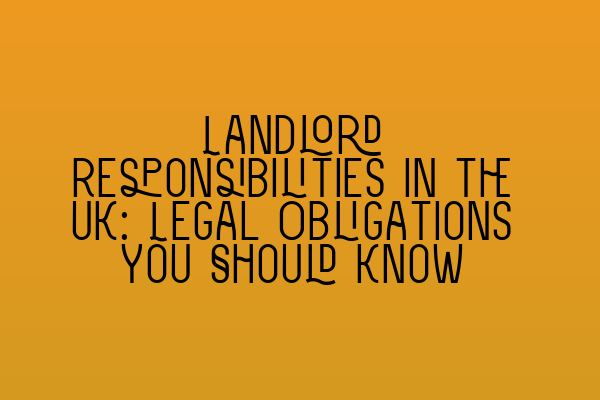—
Landlord Responsibilities in the UK: Legal Obligations You Should Know
As a landlord in the UK, it is important to be aware of and understand your legal obligations and responsibilities. Failure to comply with these obligations can lead to legal issues, financial penalties, and damage to your reputation as a responsible landlord. In this blog post, we will highlight and explain the key landlord responsibilities you should know.
Renting out Safe and Healthy Property
One of the primary responsibilities of a landlord in the UK is to provide a safe and healthy living environment for their tenants. This includes ensuring that the property meets the minimum standards for health, safety, and amenities, as set out in the Housing Act 2004.
Some key aspects to consider include:
- Gas Safety: It is a legal requirement to have annual gas safety checks conducted by a Gas Safe registered engineer. A valid Gas Safety Certificate must be provided to tenants before they move in.
- Electrical Safety: Although not currently a legal requirement for all landlords, it is highly recommended to have the electrical installations in the rented property regularly inspected and tested by a qualified professional.
- Fire Safety: Landlords must ensure that the property has adequate fire precautions in place, such as fire alarms, fire extinguishers, and fire escape routes. It is essential to regularly check these safety measures to ensure they are in good working order.
- Mould and Dampness: Landlords should address any issues of mould and dampness promptly to maintain a healthy living environment for tenants.
Repairs and Maintenance
Landlords have a legal duty to ensure that the property remains in good repair and is maintained to a reasonable standard throughout the tenancy. This includes:
- Structural Integrity: Landlords are responsible for the maintenance and repair of the property’s structure, such as the roof, walls, and foundations.
- Sanitary Installations: Landlords must ensure that all sanitary installations, including toilets, sinks, basins, and baths or showers, are in good working order.
- Heating and Hot Water: Providing adequate heating and hot water is crucial. Landlords should ensure that heating systems, boilers, and radiators are in working condition and are serviced regularly.
Tenant Safety and Protection
As a landlord, you have a duty of care towards your tenants. This includes protecting their safety and security.
- Tenant Deposits: Landlords are required to protect their tenant’s deposit in a government-approved tenancy deposit protection scheme.
- Tenant Privacy: Respecting the privacy of your tenants is important. You should provide adequate notice before entering the rented property, except in case of emergency.
- Insurance: Landlords should have appropriate insurance coverage to protect their property and any liability in case of accidents or damages.
Tenant Communication and Documentation
Effective communication with your tenants is crucial for a successful tenancy. It helps establish a good landlord-tenant relationship and avoids misunderstandings or disputes. It is vital to:
- Tenancy Agreements: A written tenancy agreement is essential to clearly outline the rights and responsibilities of both parties. It should cover key details such as rent amount, payment schedule, and duration of the tenancy.
- Providing Notices: Landlords need to provide appropriate notices to tenants for various purposes, such as rent increases, repairs, or termination of tenancy.
Conclusion
Being a landlord comes with significant responsibilities and legal obligations in the UK. By understanding and fulfilling these obligations, you can ensure a safe, healthy, and productive tenancy experience for both yourself and your tenants.
At SQE Property Law & Land Law, we understand the complexities of landlord responsibilities. If you require legal advice or assistance in navigating the legal landscape of property and land law, do not hesitate to contact our team of experienced solicitors.
—
